Disclaimer: These daily blogs are based on journal entries during my two and a half week trip broken into seven installments. Over the next week, you will learn more and more. The idea behind doing it this way is so you can go through the process of experiencing a portion of my experiences in the same progression of events that I did. The goal is that by the end of the seventh blog, you will have the context to understand why and how I intend to continue serving these people.
First Impressions: Day 4 -- August 7, 2013
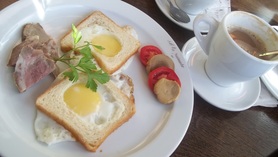
After nearly 14.5 hours of sitting in a van—including stopping for breakfast where I had eggs sunny-side up for the first time—we arrived in Uzhhorod on the Western region of Ukraine near the Slovakian border. We spent more time on the bus within Ukraine than we spent flying to Ukraine from LA. About a half hour before arriving to our in-field host’s home, we stopped at a supermarket in the main marketplace about 20-25 kilometers away from the village to get some food items that we did not want to spoil. As soon as we pulled in the parking lot, a bunch of Gypsy kids stormed our van to beg or steal, which is precisely the reputation Gypsies have.
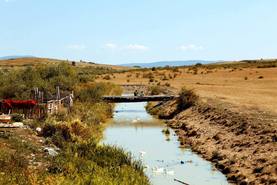
Our in-field host welcomed us with lunch and then we had some free time before heading to the village; there were three locale options for us to go in the area, and our national host evaluated all three to determine where we were needed the most. After evaluating, we set out for a small village about three kilometers away; the village is filled with Gypsies—he was pretty certain this was where we were going but evaluated the other two just to make sure.
As we drove up to the village, we first passed a large field, dry, desolate and filled with piles upon piles of cow droppings to our right, and to our left was dry, empty land that went further than you could see. Just as we entered the village, we saw a river that served as the dividing line between the field and the village. Even in the two seconds that we had to see as we drove past we could see the trash, and the milky, pasty-blue color of the water, but also the sight of children screaming with joy as they splashed in the water.
As we drove up to the village, we first passed a large field, dry, desolate and filled with piles upon piles of cow droppings to our right, and to our left was dry, empty land that went further than you could see. Just as we entered the village, we saw a river that served as the dividing line between the field and the village. Even in the two seconds that we had to see as we drove past we could see the trash, and the milky, pasty-blue color of the water, but also the sight of children screaming with joy as they splashed in the water.
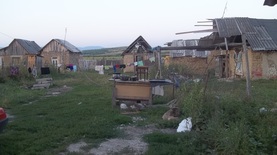
We drove past a dozen or so small single-story cement-block houses that looked as if they were half built, falling apart or both before stopping in front of the main church building for this village. When we went to the village, Gypsy kids stormed our van too but with expressions of excitement and hope, rather than anguish and hopelessness. There had to have been a difference between the two Gypsies we encountered. Why was there such a contrast within their realm of poverty?
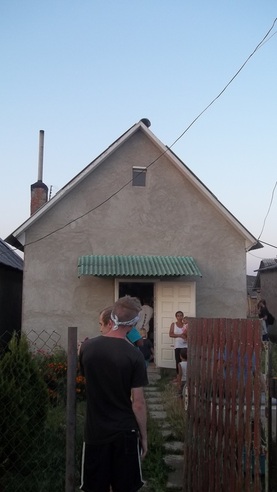
In the village, Gypsy kids live in small homes with their parents and usually 6-8 other kids, and they are told that if they grow up and run away from home, they are on their own, but if they stay around, they are family. Outside of the village, for the Gypsies that run away, in almost every case, they are thrown into prostitution, sex trafficking, drug usage/distribution, and what they are most known for—theft.
This church is the central point for the whole village; it was planted by the Christian Reformed Church denomination several years ago, although the pastor that came with it left just months after due to his inability to read or write in Ukrainian. I was incredibly shocked to hear this since I was raised in the CRC, and I currently serve in youth ministry in the CRC while I attend seminary to become a pastor. The church, while the gate is open, sits on the land allotted to the Baron. The Baron is elected by the village from within by majority vote. The Baron also serves as the creditor for the village; when individual families need to pay for materials to buy a home, he essentially owns their loan. The Baron is making an intentional effort to work with Hope for Orphans in a committed partnership towards holistic growth in this village.
The next big project Hope for Orphans is working on for this village is a self-sustaining farm. They have already acquired the land, and in fact, the government was willing to give it to them for free because of the proven success they have had elsewhere in the country. A major problem with Gypsies is they are raised in a culture where work is not overtly encouraged or done by most of the adults.
This church is the central point for the whole village; it was planted by the Christian Reformed Church denomination several years ago, although the pastor that came with it left just months after due to his inability to read or write in Ukrainian. I was incredibly shocked to hear this since I was raised in the CRC, and I currently serve in youth ministry in the CRC while I attend seminary to become a pastor. The church, while the gate is open, sits on the land allotted to the Baron. The Baron is elected by the village from within by majority vote. The Baron also serves as the creditor for the village; when individual families need to pay for materials to buy a home, he essentially owns their loan. The Baron is making an intentional effort to work with Hope for Orphans in a committed partnership towards holistic growth in this village.
The next big project Hope for Orphans is working on for this village is a self-sustaining farm. They have already acquired the land, and in fact, the government was willing to give it to them for free because of the proven success they have had elsewhere in the country. A major problem with Gypsies is they are raised in a culture where work is not overtly encouraged or done by most of the adults.
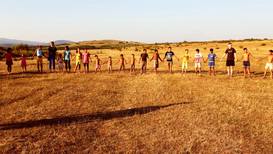
The end goal for the Hope for Orphans organization, for this village, is for families to be able to care for their children, and to instill the values of hard work on both the adults and the children, so that overtime they may earn money respectfully throughout their lives rather than the method for which they currently live. The first few hours that we were able to spend with the Gypsy kids was mainly to warm them up to us. We walked them a couple hundred yards to the open field on the other side of the river where we played field games such as soccer, partner duck-duck-goose, a variation of dodge ball, volleyball and Frisbee.
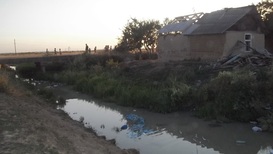
I could not help but muse over the so incredibly dirty river; it is where the villagers bathe and drink, and it is filled with trash. There are only two other water sources in the village other than this river. The first is a well at the church with water not recommended for people who were not born in Ukraine. The second that an individual family owns toward the back East corner of the village that is shared by that family's extended family, most of whom live one or two immediate houses away from this family—the well is also shared to friends of the family.
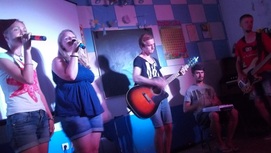
After playing with the kids on the field, we brought them back to the church building where some staff had stayed back to setup a concert for the kids. In every session, we gave the kids a concert; the Gypsy dialect has no word for worship, so we used the word ‘concert’ instead. The worship team consisted of a drummer, a guitarist, a bassist, and a backup singer from the Ukrainian team, and myself and Chelsea as main singers from the American team. We tried to integrate English with the Ukrainian worship, the reason being, most of the kids have heard many of the most popular Chris Tomlin songs.
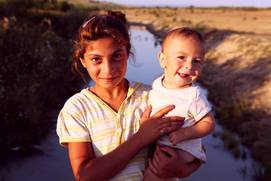
On this first night, we did three songs in Ukrainian and a fourth song in English. The kids instantly got involved with all the songs regardless of language, some singing the English songs in their native tongue and most doing the hand motions and what not. After worship, some others from our team put on a skit about Jesus Christ being a comforter to a crowd of kids, most of which watching the wordless skit with dramatic background music in awe. As we left for the evening, the kids gave us big hugs because they thought we were not coming back. After we reassured them we would be returning, their smiles grew wide and they waved us adieu as we drove away in our van under the Ukrainian moon.
 RSS Feed
RSS Feed
